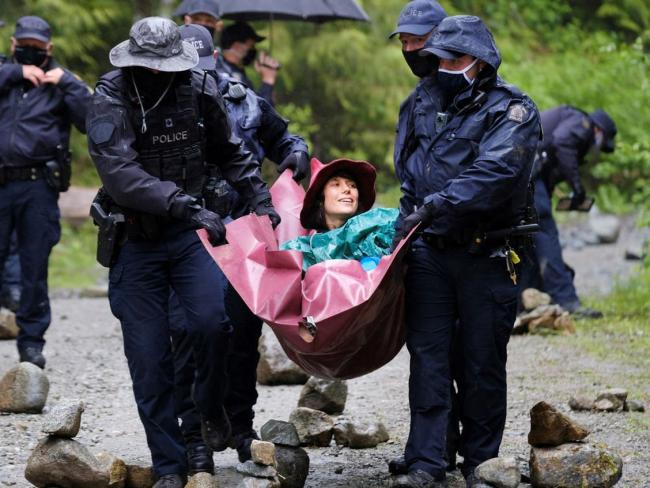Articles Menu

Sep 30, 2021
Mohandas Gandhi would be proud — civil disobedience won another round in B.C. Supreme Court and the rule of law was defined as much more than simply law enforcement.
Justice Douglas Thompson’s refusal to extend a one-year injunction restricting protests against logging in the Fairy Creek watershed emphasized the impartial status of courts and civil rights are equally important societal values.
A top lawyer involved in the case, Steven Kelliher said the injunction raised serious concerns and should never have been issued:
“The courts get drawn into an enforcement role, stepping aside from their adjudicative role that we expect them to have, and they run the risk that they are going to be tainted both by the politics of the day — which is significant when there is large public disagreement and civil disobedience — and they are also going to be tainted by the manner in which the injunction was enforced.”
In his decision Tuesday, Justice Thompson cited the damage to the court’s reputation as a major concern.
It should have come as no surprise.
Injunctions have long and often turned the court into a tool for Big Business and Bad Government.
They have been used to suppress dissent and deal with protests since the 1990s after the criminal code proved too expensive, cumbersome and ineffective.
In 1989, 70 individuals were prosecuted on mischief charges relating to protests against resource extraction in Strathcona Park. Notwithstanding the disruptions and damage they caused, 67 were acquitted, only three were convicted and received minor sentences.
The trials were drawn out over a period of 18 months, however, sapping official and private resources, and drawing further attention to the issue.
At Clayoquot Sound in 1993, instead, an injunction was obtained and more than 700 people prosecuted for criminal contempt.
The trials were concluded within eight months and almost all were convicted. The average jail sentence was three weeks.
Injunctions are like papal bulls. There is no maximum sentence for contempt and no time off for good behaviour.
Not surprisingly, after Clayoquot, one level of government or another, some resource company or Big Business used the technique to transform civil disobedience into contempt of court.
It gave the rule of law a black eye.
In 1994, a labour dispute at a construction site in Port Alberni resulted in the conviction of more than 90 individuals for contempt. On average, their trials lasted one or two days. Sentences ranged between 10 and 14 days in jail.
The late Court of Appeal Justice Josiah Wood complained “the courts have been drawn into a role which they were never intended to perform, and for which they are ill-suited.”
Retired B.C. Supreme Court Justice Ian Pitfield similarly denounced the policy as a fraud: “The analysis that applies in relation to private disputes has been applied in cases of civil disobedience, notwithstanding that the true nature of the debate is a contest between members of the public on the one hand and policy-makers on the other.”
Justice Mark McEwan stridently labeled it “a kind of officially induced abuse of process.”
These cases don’t involve a legal question, but questions of social policy.
Still, numerous logging, environmental and First Nations conflicts have been handled like this.
The Fairy Creek dispute brought all of the historic concerns to the fore.
“Tensions, as the judge mentioned, were rising; physical encounters were becoming more severe; there was the escalation in the use of pepper spray,” Kelliher explained.
“There was an elderly woman and her mature daughter — we watched this video as a police officer tore their masks off their faces, their COVID masks, and the lawyer for the Attorney General of Canada explained it, justified it, that it was to ensure maximum pain was inflicted by the pepper spray. I tell you that was a chilling moment to hear — that things had come to the point that lawful protesters were being treated in such a way in Canada. Shocking.”
Usually, law enforcement prevails — this time, other values triumphed, as they have in other decisions involving say, search and seizure or entrapment issues.
“What Judge Thompson did, is look at the public interest in a far broader way,” Kelliher said.
“Of course, law enforcement is important. But there are other societal values that are also important … and here, number one, was the impact on the perception of the administration of justice in respect of how that injunction was being carried out … it said law enforcement isn’t everything. As the courts have said forever: if law enforcement prevails at every turn, you have yourself a police state.”
The effect of Thompson’s judgment on other disputes remains to be seen in a province beset by rail stoppages, road blockades, pipeline protests, Indigenous demonstrations …
The police can lay criminal charges where warranted.
Kelliher thinks the specific facts in each case will be paramount as judges making such decisions must assess a number of factors that cannot be precisely weighed or measured — all on the basis of incomplete or partial evidence usually untested by cross-examination:
“The Fairy Creek biosphere — the 500-800 year-old trees, its proximity to Victoria, and the tenacity and courage of those people who have come forward and stuck with it to prevent that — that’s all sort of unique, so it’s very difficult to say what bearing that will have on other circumstances. But I think the court has broadened the notion of public interest beyond simply law enforcement and that will have an impact down the road.”
[Top photo: RCMP officers carry a woman they arrested at the Waterfall camp blockade against old growth timber logging in the Fairy Creek area of Vancouver Island last May. While law enforcement usually prevails in instances of environmental protests, this week other values triumphed in a B.C. Supreme Court ruling. PHOTO BY JENNIFER OSBORNE /REUTERS file]